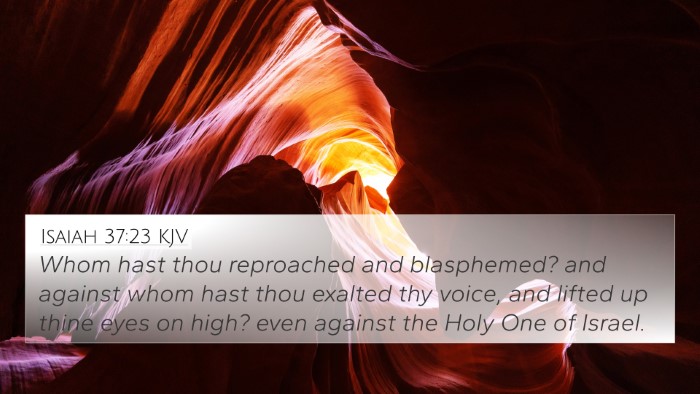Understanding Isaiah 36:15
Verse: Isaiah 36:15 - "Neither let Hezekiah make you trust in the LORD, saying, The LORD will surely deliver us: this city shall not be delivered into the hand of the king of Assyria."
Meaning and Interpretation
The verse Isaiah 36:15 occurs within a significant historical context where the Assyrian king, Sennacherib, is attempting to instill fear and doubt in the hearts of the inhabitants of Jerusalem by questioning their faith in God. This analysis will draw insights from renowned public domain commentaries to deepen our understanding.
Historical Context
This situation arises during King Hezekiah's reign, a time marked by the threat of Assyrian invasion. The Assyrian army was known for its brutality, and their leaders often employed psychological tactics to undermine the resolve of besieged cities.
Commentary Insights
-
Matthew Henry:
Henry emphasizes the strategy of the Assyrians to sow seeds of doubt regarding God's deliverance. He notes that external challenges can make one question the promises of God, thus encouraging believers to remain steadfast in their faith despite the circumstances.
-
Albert Barnes:
Barnes comments on the rhetorical tactics employed by the Assyrians, stating that the appeal to trust in God was a means to manipulate the people into despair. He highlights the importance of understanding that faith must be anchored in God's character and past faithfulness, not just in the current situation.
-
Adam Clarke:
Clarke adds to the discourse by pointing out the psychological warfare inherent in this verse. He explains that the enemy's aim was to cause the people of Jerusalem to feel isolated and hopeless, thereby weakening their resolve to trust in God's salvation.
Thematic Connections
This verse speaks to broader themes found throughout Scripture, particularly in relation to trust, faith, and deliverance. It demonstrates the struggle between divine promise and human doubt. Several other Bible verses resonate with this theme, highlighting the connections between biblical texts.
Relevant Cross-References
- Psalm 20:7: "Some trust in chariots, and some in horses: but we will remember the name of the LORD our God." - This verse emphasizes the futility of placing trust in worldly power as opposed to God.
- Isaiah 37:10-11: "Thus shall ye speak to Hezekiah king of Judah, saying, Let not thy God in whom thou trustest deceive thee..." - This passage continues the dialogue of doubt and trust in God's protection.
- 2 Kings 19:10: "Thus shall you speak to Hezekiah king of Judah, saying, 'Let not your God in whom you trust deceive you...'" - A direct parallel to the verse at hand, highlighting the continual challenge to trust in God amidst adversity.
- Jeremiah 17:5: "Cursed be the man that trusteth in man, and maketh flesh his arm..." - A powerful reminder of the dangers of misplaced trust.
- Romans 8:31: "What shall we then say to these things? If God be for us, who can be against us?" - This New Testament affirmation echoes the assurance of God's protection and support.
- Hebrews 10:23: "Let us hold fast the profession of our faith without wavering; (for he is faithful that promised)." - Encourages steadfastness in faith against external pressures.
- 1 Peter 5:8-9: "Be sober, be vigilant; because your adversary the devil, as a roaring lion, walketh about, seeking whom he may devour..." - This adds a spiritual dimension to understanding the enemy's ploys against believers.
Application and Reflection
This verse serves as a profound reminder for believers in all eras, particularly today, that faith in God is crucial, especially in the face of seemingly insurmountable trials. Hezekiah's response and reliance on God’s assurances can serve as a model of faith for contemporary believers.
Concluding Thoughts
Cross-Referencing as a Tool: Understanding the connections between Bible verses through cross-referencing is essential for deeper biblical study. By recognizing these thematic links and the conversations happening across Scripture, believers can gain a richer understanding of God’s message and the intricate relationships within biblical texts.









